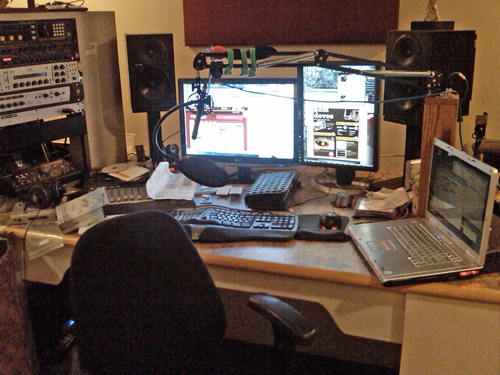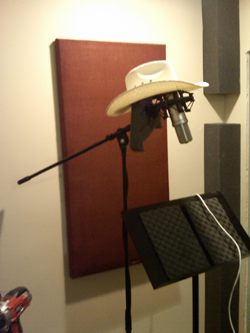
JV: Having had the opportunity to rebuild your home studio, were you able to do something extra special?
Terry: I think so. It’s a compromise between the new analog and digital world in many ways. Some might say it’s far too digital, but I like the load out. I built the computer myself rather than paying to have it done. We’ll find out in a couple years whether that was smart or stupid.
I have a quad core three-gigahertz i7 processor and 8 gig of RAM. I have about 4.3 terabytes of hard drive space. I have two audio interfaces, a Digi-002 rack, and an M-audio 1010 -- the full rack model, not the ones with the plugs hanging out the back, which I don’t think there’s any difference between other than a couple more inputs.
I have two monitors, both 24–inch screens. I have Mackie monitors for the audio. I have two main microphones, a Rode NTK, and the Hollywood standard, as they call it, the Sennheiser shotgun. For outboard gear, I have one of the classic Eventides. I have a Symetrix 528-E, and I have a Liquid Channel. I also have a Mackie controller and a Mackie Big–Knob.
The really cool thing is with the construction and the move our group has done with ‘YCD, they had these big studios and production rooms full of that big solid furniture. They were going to throw it away. So, I rented a U–haul, backed up a truck, and I now have studio furniture that I probably wouldn’t have been able to afford, nor would I want to spend that much money on anyway.
 JV: You basically rebuilt your studio twice. Looking back on those two situations, what did you learn about building the studio that you’re glad you did the way you did, and maybe something you wish you would have done differently?
JV: You basically rebuilt your studio twice. Looking back on those two situations, what did you learn about building the studio that you’re glad you did the way you did, and maybe something you wish you would have done differently?
Terry: Well, one of the things that I’m glad that I did: a long, long, long time ago when I started at ‘YCD, I had the challenge of hard drive space, and I went out and bought portable hard drives, and a FireWire card so I could take my work to and from home. I’ve updated the size of those drives several times over the decade, but I’ve always had a mirror copy on my home studio computer as my portable drives, thinking that if the portable drives ever died, I had a back up that was a couple days old at worst, you know, whenever I synced them up last.
After the flood, I could not have regretted I did that because my studio computer was completely under water and totally destroyed. There wasn’t anything that was saved in that computer. It was all garbage. I was also glad that I got sump pump insurance in Michigan and added a rider on my studio. When you’re already established, having a rider on your studio costs surprisingly little. If you already have some sort of insurance on your house, or on your renter’s insurance, it costs surprisingly little. You’d be shocked. If you can do it, get it. That was my wife’s idea, and she saved my life on that.
I learned a lot about sound dampening because I built a studio in my old house. We moved to a new house. I built that studio, had a flood, tore down the walls, rebuilt them, and had another flood. I tore down the walls and rebuilt them again. So, I’ve half–built two studios, and fully built two studios now.
There’s wonderful material out there called Green Glue. If you’re going to double board your walls, look into Green Glue, and put it between the two pieces of drywall. It does wonders. It’s just amazing. In my old studio, I had to have foam nearly everywhere. In the same house, with the same walls, in the same positions, now I can just spot treat it with sound panels, rather than having the whole room be Auralex. It’s amazing the difference it makes. Also, you can shoot insulation in your wall for super cheap. Go to Home Depot and look at the insulation that you just shoot in with the hose and the machine. It costs very, very, very little. It’s very easy to do.
JV: How about some advice for up and coming production people wanting to work their way into the top 20 markets, advice on how to perform in today’s radio environment?
Terry: Well, not that what I did is the right way to do it, but it is a way that worked for me. When I was in Tucson, I did the imaging for KIIM FM there, and I knew that being in market 61 and doing the imaging and having an air shift was not enough. I knew no one was going to hire me to be a Production Director, Commercial or Imaging Director, without me having had the full–time position before. So don’t think you can run into running, as the old proverb says. First, you must walk and crawl. It took me very little time stepping down to, I think it was market 120, to bounce back up to what was market 9, and has shrunk to market 11.
I also sent out lots and lots and lots of promos, and not to Program Directors asking them what they thought, but to creative people. You know, the Mike Lees, the Dave Foxxes, the Brian Wilsons, Ann DeWig and so on and so forth, back when Ann DeWig was at DC101. Don’t think she’s just a wonderful voice. Ann DeWig has incredible chops and skills. She may not have exercised the muscles in a while, but that girl rocks.
Reach out to your peers, all but the crankiest of production people, and even the cranky ones. They’re just tired and overworked, but they’ll give you their opinion. They’ll give you some good advice. I always personally asked them to tear it to shreds. I specifically asked them, and pleaded to them, “Don’t be nice. If this promo played on the air at your competition, what would you say? Rip it apart.” It was sometimes really, really painful, but always very, very helpful. It helped me hone my writing, my editing, and everything else. I have people from time to time who email me stuff, and I’m more than happy to give it a listen.
A young gentleman from a big small market recently sent me some stuff, and it showed a lot of promise. It had a lot of good things in it. I always ask, “Do you want me to give you a nice review and some encouragement, or do you want me to go all Simon Cowell and rip it to shreds with suggestions, with helpfulness?” Not mean, but with stark honesty. And I’m surprised at how many people actually want the stark honesty, which is really, really good. There are a lot of people out there, and this one person comes to mind in particular. He has been in this one market for a while, and he has felt very sedate, very stagnant, very trapped. I gave him a lot of words of encouragement like, “You’re only trapped if you want to be. You’re only where you are, if you want to be there.”
I was not the best jock in the world, but I did pretty darn well as a jock, and got good ratings everywhere I was. I may not be the best writer or producer, or anything else in the world, but I’m good at what I do, and I work hard, and I work long hours. I just keep at it until it sounds right to me. And whether you’re going to be the best at something, or whether you’re going to be the hardest working at something, both of those will get you places.
♦
